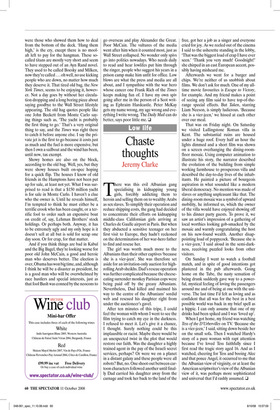Chaste thoughts
Jeremy Clarke
There was this evil Albanian gang specialising in kidnapping young girls, forcibly addicting them to heroin and selling them on to wealthy Arabs as sex slaves. To simplify their operation and reduce shipping costs, the gang had decided to concentrate their efforts on kidnapping middle-class Californian girls arriving at Charles de Gaulle airport in Paris. But when they abducted a sensitive teenager on her first visit to Europe, they hadn’t reckoned on the determination of her war-hero father to find and rescue her.
The girl was worth much more to the Albanians than their other captives ‘because she is a vier-jeen’. She was therefore set aside for an invitation-only auction for highrolling Arab sheikhs. Dad’s rescue operation was further complicated because the cheeseeating surrender monkey Parisian cops were being paid off by the greasy Albanians. Nevertheless, Dad killed and maimed his way to the centre of the Albanians’ sordid web and rescued his daughter right from under the auctioneer’s gavel.
After ten minutes of this tripe, I could feel the woman with whom I went to see the film trying to catch my eye in the darkness. I refused to meet it. Let’s give it a chance, I thought. Surely nothing could be this implausible or racist. Maybe there would be an unexpected twist in the plot that would restore our faith. Was the daughter a highly trained agent in the pay of the Israeli secret services, perhaps? Or were we on a planet in a distant galaxy and these people were all robots? But, no. One shoot-out between cartoon characters followed another until finally Dad carried his daughter away from the carnage and took her back to the land of the free, got her a job as a singer and everyone cried for joy. As we reeled out of the cinema I said to the usherette standing in the lobby, ‘That was the biggest load of crap I have ever seen.’ ‘Thank you very much! Goodnight!’ she chirped in an east European accent, possibly having misheard me.
Afterwards we went for a burger and chips. We’re neither of us snobbish about films. We don’t ask for much. One of my alltime movie favourites is Escape to Victory, for example. And my friend makes a point of seeing any film said to have top-of-therange special effects. But Taken, starring Liam Neeson, is simply ludicrous. ‘Because she is a vier-jeen,’ we hissed at each other over our meal.
That was on Friday night. On Saturday we visited Lullingstone Roman villa in Kent. The substantial ruins are housed under a huge roof. Every half an hour the lights dimmed and a short film was shown on a screen overhanging the dining-roomfloor mosaic. Using computer animation to illustrate his story, the narrator described the evolution of the building from simple working farmhouse to prosperous villa and described the day-to-day lives of the inhabitants. He painted a picture of bourgeois aspiration in what sounded like a modern liberal democracy. No mention was made of slaves or anything unpleasant like that. The dining-room mosaic was a symbol of upward mobility, he informed us, which the owner of the villa would have enjoyed showing off to his dinner party guests. To prove it, we saw an artist’s impression of a gathering of local worthies looking gob-smacked by the mosaic and warmly congratulating the host on his new-found wealth. Another disappointing load of poppycock. ‘Because she is a vier-jeen,’ I said aloud in the semi-darkness, receiving puzzled looks from other visitors.
On Sunday I went to watch a football match, and in spite of good intentions got plastered in the pub afterwards. Going home on the Tube, the nasty sensation of being drunk suddenly gave way to a powerful, mystical feeling of loving the passengers around me and of being at one with the universe. The last time I’d felt as loving and as confident that all was for the best in a best possible world was back in my brief spell as a hippie. I can only assume that one of my drinks had been spiked and I was ‘loved up’.
When I got home, my friend was watching Tess of the D’Urbervilles on TV. ‘Because she is a vier-jeen,’ I said, sitting down beside her on the small sofa. Then I watched Hardy’s story of a pure woman with rapt attention because I’ve loved Tess faithfully since I first read the tragic story aged 16. And as I watched, cheering for Tess and booing Alec and that ponce Angel, it occurred to me that the Albanian view of virginity, or at least the American scriptwriter’s view of the Albanian view of it, was perhaps more sophisticated and universal that I’d rashly assumed. ❑










































































 Previous page
Previous page